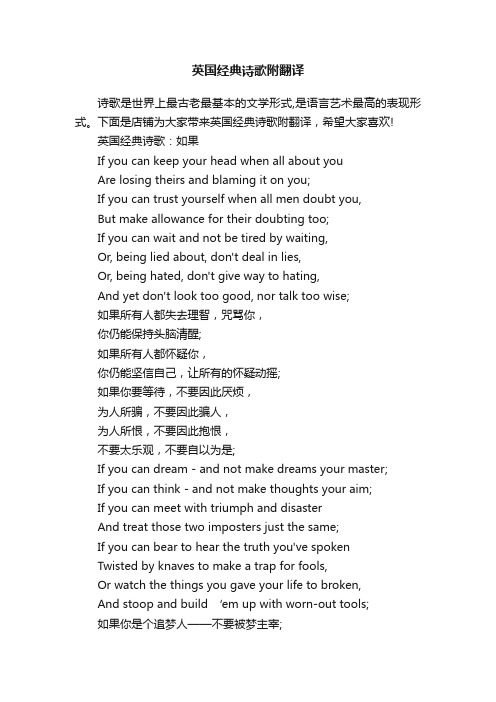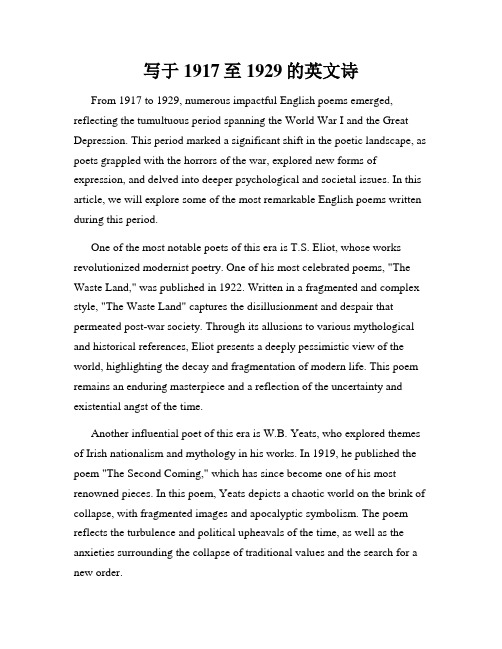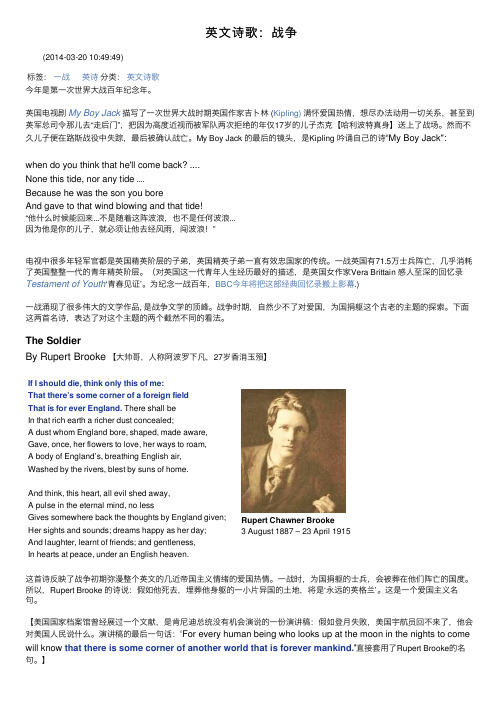二战前后的英国诗英文版
英国人最爱的英语诗歌:死神,你莫骄傲 by John Donne(双语)

死神,你莫骄傲>这首诗选自约翰-多恩的《神圣十四行诗》。
诗中说明死亡是瞬间的,而死后的欢乐则是永恒的。
死 0<死神,你莫骄傲>这首诗选自约翰-多恩的《神圣十四行诗》。
诗中说明死亡是瞬间的,而死后的欢乐则是永恒的。
死亡是我们必须面对的问题,死亡可以带走一个人的一切,但我们不必为此而感到恐惧。
约翰·多恩是英国17世纪最伟大的诗人之一,也是玄学诗派的代表人物,他的《死神,你莫骄傲》是他最杰出的玄学诗。
在《死神,你莫骄傲》这首诗中,他看透生死,体现出了一种艺术人生观,这与道家庄子笑谈生死的艺术人生观有着异曲同工之妙。
Death Be Not Proud 死神,你莫骄傲----美音版Death Be Not Proud 死神,你莫骄傲----英音版Death Be Not Proud 死神,你莫骄傲 by John Donne 约翰.多恩Death be not proud, though some have called theeMighty and dreadful, for, thou art not so,For, those, whom thou think'st, thou dost overthrow,Die not, poor death, nor yet canst thou kill me;From rest and sleep, which but thy pictures be,Much pleasure, then from thee, much more must flow,And soonest our best men with thee do go,Rest of their bones, and soul's delivery.Thou art slave to fate, chance, kings, and desperate men,And dost with poison, war, and sickness dwell,And poppy, or charms can make us sleep as well,And better than thy stroak; why swell'st thou then?One short sleep past, we wake eternally,And death shall be no more; Death, thou shalt die.死神,你莫骄傲,尽管有人说你如何强大,如何可怕,你并不是这样;你以为你把谁谁谁****了,其实,可怜的死神,他们没死;你现在也还杀不死我。
英国经典诗歌附翻译

英国经典诗歌附翻译诗歌是世界上最古老最基本的文学形式,是语言艺术最高的表现形式。
下面是店铺为大家带来英国经典诗歌附翻译,希望大家喜欢!英国经典诗歌:如果If you can keep your head when all about youAre losing theirs and blaming it on you;If you can trust yourself when all men doubt you,But make allowance for their doubting too;If you can wait and not be tired by waiting,Or, being lied about, don't deal in lies,Or, being hated, don't give way to hating,And yet don't look too good, nor talk too wise;如果所有人都失去理智,咒骂你,你仍能保持头脑清醒;如果所有人都怀疑你,你仍能坚信自己,让所有的怀疑动摇;如果你要等待,不要因此厌烦,为人所骗,不要因此骗人,为人所恨,不要因此抱恨,不要太乐观,不要自以为是;If you can dream - and not make dreams your master;If you can think - and not make thoughts your aim;If you can meet with triumph and disasterAnd treat those two imposters just the same;If you can bear to hear the truth you've spokenTwisted by knaves to make a trap for fools,Or watch the things you gave your life to broken,And stoop and build ‘em up with worn-out tools;如果你是个追梦人——不要被梦主宰;如果你是个爱思考的人——不要以思想者自居;如果你遇到骄傲和挫折把两者当骗子看待;如果你能忍受,你曾讲过的事实被恶棍扭曲,用于蒙骗傻子;或者,看着你用毕生去看护的东西被破坏,俯下身去,用破旧的工具把它修补;If you can make one heap of all your winnings And risk it on one turn of pitch-and-toss,And lose, and start again at your beginnings And never breath a word about your loss;If you can force your heart and nerve and sinew To serve your turn long after they are gone, And so hold on when there is nothing in you Except the Will which says to them: "Hold on"; 如果在你赢得无数桂冠之后,然后孤注一掷再搏一次,失败过后,东山再起,不要抱怨你的失败;如果你能迫使自己,在别人走后,长久坚守阵地,在你心中已空荡荡无一物,只有意志告诉你“坚持!”;If you can talk with crowds and keep your virtue, Or walk with kings - nor lose the common touch; If neither foes nor loving friends can hurt you;If all men count with you, but none too much;If you can fill the unforgiving minuteWith sixty seconds' worth of distance run - Yours is the Earth and everything that's in it,如果你与人交谈,能保持风度,伴王同行,能保持距离;如果仇敌和好友都不害你;如果所有人都指望你,却无人全心全意;如果你花六十秒进行短程跑,填满那不可饶恕的一分钟——你就可以拥有一个世界,这个世界的一切都是你的,更重要的是,孩子,你是个顶天立地的人。
写于1917至1929的英文诗

写于1917至1929的英文诗From 1917 to 1929, numerous impactful English poems emerged, reflecting the tumultuous period spanning the World War I and the Great Depression. This period marked a significant shift in the poetic landscape, as poets grappled with the horrors of the war, explored new forms of expression, and delved into deeper psychological and societal issues. In this article, we will explore some of the most remarkable English poems written during this period.One of the most notable poets of this era is T.S. Eliot, whose works revolutionized modernist poetry. One of his most celebrated poems, "The Waste Land," was published in 1922. Written in a fragmented and complex style, "The Waste Land" captures the disillusionment and despair that permeated post-war society. Through its allusions to various mythological and historical references, Eliot presents a deeply pessimistic view of the world, highlighting the decay and fragmentation of modern life. This poem remains an enduring masterpiece and a reflection of the uncertainty and existential angst of the time.Another influential poet of this era is W.B. Yeats, who explored themes of Irish nationalism and mythology in his works. In 1919, he published the poem "The Second Coming," which has since become one of his most renowned pieces. In this poem, Yeats depicts a chaotic world on the brink of collapse, with fragmented images and apocalyptic symbolism. The poem reflects the turbulence and political upheavals of the time, as well as the anxieties surrounding the collapse of traditional values and the search for a new order.Moving on, we encounter the works of Robert Frost, an American poet who captured the spirit of rural life and the human condition. His poem "Stopping by Woods on a Snowy Evening," published in 1923, is a beautiful reflection on solitude, nature, and the allure of the unknown. Through its deceptively simple language and serene imagery, Frost invites readers to contemplate the choices and responsibilities that shape our lives. This poem embodies Frost's deep connection with nature and his ability to find profound meaning within the seemingly ordinary.The period from 1917 to 1929 also saw the emergence of female voices in English poetry. One remarkable poet of this era is Sylvia Plath, whose intense and often confessional verses continue to captivate readers. In 1965, her collection of poems, "Ariel," was posthumously published, including the iconic poem "Daddy." Through this poem, Plath explores themes of loss, trauma, and the complexities of familial relationships. With its raw and visceral language, "Daddy" showcases Plath's ability to confront her inner demons and engage in a cathartic release of emotions.Lastly, we cannot discuss English poetry of this period without mentioning W.H. Auden, a prolific poet who explored a wide range of themes. In 1936, Auden published the poem "Funeral Blues," which gained renewed popularity through its inclusion in the movie "Four Weddings and a Funeral." With its elegiac tone and mournful imagery, Auden captures the essence of grief and loss. The poem resonates with readers for its universal portrayal of human emotions and the profound impact of death on individuals and society.These are just a few examples of the remarkable English poems written between 1917 and 1929. Each of these poets contributed to the evolution of the poetic form and left a lasting impact on subsequent generations. Through their words, we can gain insights into the turbulent historical context of the time and the complex range of human experiences. These poems stand as a testament to the power of language and art in capturing and articulating the human condition.。
威尔弗雷德欧文战争诗歌-最新年精选文档

威尔弗雷德欧文战争诗歌虽然一直自视为反战份子,欧文仍于1915年10月入伍,并受阶为中尉。
他于1917年1月加入法国曼彻斯特军团。
在法国其间,欧文开始将他的战争经验写成诗篇。
1917年夏天欧文因为被诊断患有弹震击(战争精神病的一种)而转入苏格兰的克雷格劳加特(Craiglockhart)战时医院。
在休养复原其间,欧文遇到了诗人萨松,并对他的战争态度也极为欣赏。
其间,欧文写下了一系列的经典战争主题的诗篇,包括Anthem for Doomed Youth (青春挽歌)、Disabled (残)、Dulce et Decorum Est (为国捐躯)以及Strange Meeting (不可思议的聚会)。
1918年8月欧文返回其被授予十字勋章的西线战场。
1918年11月4日,当欧文领军横越桑布尔奥西运河(Sambre - Osie Canal)时,遭机关枪扫射身亡。
一周后,停战协定被签订。
欧文童年时期就酷爱文学诗歌,尤其受到浪漫主义诗人约翰?济慈(John Keats)诗歌的影响。
在欧文的诗歌创作中尽管充满恐怕残酷的战斗景象,但是济慈的感官之美在他的世行中依然清晰可见[1]。
通过欧文对战争中极度恐怖的描写,我们也不难发现出一种壮丽的美。
欧文的诗歌在1917年经历了显著的变化。
作为战争心理治疗的一部分,欧文的医生亚瑟?布洛克(Arthur Brock)鼓励他把自己的战争经历以及战争造成的精神幻觉转换为诗歌。
同时,萨松受到弗洛伊德精神分析的影响,帮助欧文努力走出战争的精神创伤并鼓励他进行诗歌创作。
作为欧文的挚友和创作导师,萨松对其后来的诗歌风格的形成起到了深远的影响。
欧文的最著名的两首诗歌- Anthem for Doomed Youth (青春挽歌)和Dulce et Decorum Est (为国捐躯)都体现出萨松对其直接的影响。
欧文诗歌通过使用联韵(Para-rhyme)以及大量的依赖谐音(Assonance)可谓是独树一帜。
英国诗歌史 英文全文

T ABLE OF C ONTENTS1. An Outline of the Challenges, Features and Objectives1 of A History of British PoetryS IBYLLE B AUMBACH,A NSGAR NÜNNING &B IRGIT N EUMANN2. Anglo-Saxon Heroic and Elegiac Poetry: “Deor”17A NDREW J AMES J OHNSTON293. Middle English Narrative Poetry: Geoffrey ChaucerA NNETTE K ERN-S TÄHLER41 4. Genres and Developments in Medieval Poetry: The Fifteenth CenturyW OLFRAM K ELLER5. English Poetry in the Sixteenth Century: Sir Thomas Wyatt,Henry Howard, Earl of Surrey, Anne Locke and the55Petrarchan Sonnet TraditionA NJA MÜLLER-W OOD6. Genres and Developments in Elizabethan Poetry I: Edmund Spenser67C LAUDIA O LK79 7. Genres and Developments in Elizabethan Poetry II: Shakespeare’s SonnetsS IBYLLE B AUMBACH8. Secular Metaphysical Poetry: John Donne, Thomas Carew and91Katherine PhilipsA NDRÉ O TTO9. Religious Metaphysical Poetry: George Herbert and Henry Vaughan107 M ATTHIAS B AUER10. Poetry and Politics in the Civil War Period: Andrew Marvell, John Milton,Margaret Cavendish and Katherine Philips121I NGO B ERENSMEYER11. Restoration Satiric and Erotic Poetry: The Court Wits,135 The Earl of Rochester and Aphra BehnJÜRGEN K AMM12. The Augustan Age and the Mock-Heroic Poem:Alexander Pope’s “The Rape of the Lock”151B IRGIT N EUMANN13. Poetic Genres in the Augustan Age: Jonathan Swift and Verse Satire167 J ENS M ARTIN G URR18114. Scottish Poetry: James Macpherson and Robert BurnsC ORDULA L EMKE15. Women Writers in the Eighteenth Century and the Romantic Age:191 Mary Leapor and Charlotte SmithS ANDRA H EINEN16. Early Romanticism: Thomas Chatterton, William Cowper andWilliam Blake203 R ALF H AEKEL17. Poetic Genres in the Romantic Age I: Nature Poetry andWilliam Wordsworth and Samuel Taylor Coleridge’s Lyrical Ballads217 K AI M ERTEN18. Poetic Genres in the Romantic Age II: Percy Bysshe Shelley’s,John Keats’s and Lord Byron’s Odes229 U TE B ERNS19. Poetic Genres in the Victorian Age I: Letitia Elizabeth Landon’s andAlfred Lord Tennyson’s Post-Romantic Verse Narratives243A NNE-J ULIA Z WIERLEIN20. Poetic Genres in the Victorian Age II: Robert Browning’s Dramatic257 Monologues and Elizabeth Barrett Browning’s Love PoetryR ENATE B ROSCH21. Poetic Genres in the Victorian Age III: Algernon Charles Swinburne271 V IRGINIA R ICHTER22. Genres and Developments in Fin-de-siècle Urban Poetrybetween Naturalism and Aestheticism: William Ernest Henley,283 John Davidson and Arthur SymonsA NSGAR NÜNNING23. Poetic Responses to the First World War: Siegfried Sassoon,Wilfred Owen and Isaac Rosenberg297 M ARTIN LÖSCHNIGG24. Poetic Tendencies in the Age of High Modernism I: W.B. Yeats andT.S. Eliot311 P ETER HÜHN25. Poetic Developments and Genres in the Age of High Modernism II:D.H. Lawrence325A NNA-M ARGARETHA H ORATSCHEK26. Poetry of the Thirties and Forties: W.H. Auden and Dylan Thomas339 P ATRICK G ILL27. Poetry of the Fifties and Sixties between Innovation and Tradition:351 Philip Larkin and the MovementJ OANNA R OSTEK28. Poetic Genres and Developments in the 1970s and 1980s:Seamus Heaney and Ted Hughes363 M ARION G YMNICH29. Contemporary Feminist Poetry: Vicki Feaver and Carol Ann Duffy377E VA Z ETTELMANN30. West Indian British Poetry: John Agard, James Berry, Fred D’Aguiar,391 and Grace NicholsG EROLD S EDLMAYR31. New Departures and Developments: Contemporary British Poetry409B IRGIT N EUMANN &S IBYLLE B AUMBACH。
英文诗歌:战争

英⽂诗歌:战争(2014-03-20 10:49:49)标签:⼀战英诗分类:英⽂诗歌今年是第⼀次世界⼤战百年纪念年。
英国电视剧My Boy Jack描写了⼀次世界⼤战时期英国作家吉⼘林 (Kipling)满怀爱国热情,想尽办法动⽤⼀切关系,甚⾄到英军总司令那⼉去“⾛后门”,把因为⾼度近视⽽被军队两次拒绝的年仅17岁的⼉⼦杰克【哈利波特真⾝】送上了战场。
然⽽不久⼉⼦便在路斯战役中失踪,最后被确认战亡。
My Boy Jack 的最后的镜头,是Kipling 吟诵⾃⼰的诗“My Boy Jack":when do you think that he'll come back? ....None this tide, nor any tide ....Because he was the son you boreAnd gave to that wind blowing and that tide!“他什么时候能回来...不是随着这阵波浪,也不是任何波浪...因为他是你的⼉⼦,就必须让他去经风⾬,闯波浪!”电视中很多年轻军官都是英国精英阶层的⼦弟,英国精英⼦弟⼀直有效忠国家的传统。
⼀战英国有71.5万⼠兵阵亡,⼏乎消耗了英国整整⼀代的青年精英阶层。
(对英国这⼀代青年⼈⽣经历最好的描述,是英国⼥作家Vera Brittain 感⼈⾄深的回忆录Testament of Youth‘青春见证’。
为纪念⼀战百年,BBC今年将把这部经典回忆录搬上影幕.)⼀战涌现了很多伟⼤的⽂学作品, 是战争⽂学的顶峰。
战争时期,⾃然少不了对爱国,为国捐躯这个古⽼的主题的探索。
下⾯这两⾸名诗,表达了对这个主题的两个截然不同的看法。
The SoldierBy Rupert Brooke【⼤帅哥,⼈称阿波罗下凡,27岁⾹消⽟殒】If I should die, think only this of me:That there’s some corner of a foreign fieldThat is for ever England. There shall beIn that rich earth a richer dust concealed;A dust whom England bore, shaped, made aware, Gave, once, her flowers to love, her ways to roam,A body of England’s, breathing English air,Washed by the rivers, blest by suns of home.And think, this heart, all evil shed away,A pulse in the eternal mind, no lessGives somewhere back the thoughts by England given; Her sights and sounds; dreams happy as her day; And laughter, learnt of friends; and gentleness,In hearts at peace, under an English heaven.Rupert Chawner Brooke3 August 1887 – 23 April 1915这⾸诗反映了战争初期弥漫整个英⽂的⼏近帝国主义情绪的爱国热情。
二战后的诗歌
The change that has most transformed American society, however, has been the rise of the mass media and mass culture. First radio, then movies, and now an allall-powerful, ubiquitous television presence have changed American life at its roots. From a private, literate, elite culture based on the book, the eye, and reading, the United States has become a media culture attuned to the voice on the radio, the music of compact discs and cassettes, film, and the images on the television screen.
The term is usually applied to certain poets of the United states from the late 1950s to the late 1960s, notably Robert Lowell. The term’s distinctive sense depends on the candid examination of what were at the time of writing virtually unmentionable kinds of private distress. The genuine strengths of confessional poets, combined with the pity evoked by their high suicide rate, encouraged in the reading public a romantic confusion between poetic excellence and inner torment.
wilfred owen的诗
Wilfred Owen(1893-1918)是一位英国著名的第一次世界大战诗人,他的诗作在当时和后世都产生了深远的影响。
在短暂的诗歌创作生涯中,他写出了许多关于战争的作品,揭露了战争的残酷真相和对人类的摧残。
本文将从以下几个方面来探讨Wilfred Owen的诗歌创作。
一、Wilfred Owen的生平及艺术风格Wilfred Owen出生在英国的奥斯特里(Aston)村,父亲是一名银行职员。
他在伯克郡的顿恩沃特(Dunottar)接受教育,后来在伦敦修读法律。
1915年他被征召入伍,参加了第一次世界大战,并在战争中受了伤。
在伦敦的恢复期间,他结识了一位崭露头角的诗人西格弗里德•萨瑟(Siegfried Sassoon),萨瑟对他有很大的影响。
返沪后,Owen通过写作来宣泄内心的痛苦和对战争的怀疑,他的诗歌风格压抑悲观,充满了对战争的恐惧和反战情感。
他讲述的主题主要围绕战士的生活和战场上的种种不幸遭遇,以真实的笔触描绘了战争的痛苦和无情。
二、Wilfred Owen的代表作品1.《战歌》(Anthem for Doomed Youth):这首诗描绘了战场上年轻战士们的凄凉命运,表达了对战争残酷的深切怀疑和悲痛。
2.《垂落的人》(Disabled):这首诗讲述了一位战士因战争而致残的故事,通过叙述他追忆往事的思绪,展现了战争对个人命运的摧残和破坏。
3.《被杀的人》(Dulce et Decorum Est):这首诗描绘了一场气味刺鼻的氯气攻击,生动地展现了战场上的惨状和对战争的愤怒和憎恶。
三、Wilfred Owen的影响及价值Wilfred Owen的诗歌作品对战后世界文学产生了深远的影响。
他以其赤诚的态度和对战争的深刻怀疑,表达了一代人对战争的反思和反抗。
他的诗歌作品在战后成为反战文学的典范,影响了一批反战诗人和作家的创作,如塞缪尔•贝克特(Samuel Beckett)和伍尔夫•冯•霍夫曼斯塔尔(Wolfgang von Hofmannsthal)等。
弗罗斯特诗歌英文版
弗罗斯特诗歌英文版1. Oh, Frost's English poems are like hidden gems! You know, when I first read "The Road Not Taken", it was like I was right there with the speaker, standing at that fork in the road. "Two roads diverged in a yellow wood", and I could almost feel the indecision, the weight of choosing one path over the other. It's not just abouta walk in the woods, it's about life choices, man.2. Frost's English poetry? It's a whole world of its own. Take "Stopping by Woods on a Snowy Evening". I felt like I was the traveler, just for a moment. "Whose woods these are I think I know. His house is in the village though." It's so serene, like a beautiful, quiet painting that you can step into. And you can't help but wonder, have you ever been in such a peaceful yet slightly eerie place?3. Man, Frost's English poems are amazing! "Mending Wall" is a classic. It's like watching two neighbors having a conversation right in front of you. "Good fences make good neighbors." But is it really about the fence? It's more about human relationships, about how we interact with each other. I can almost hear the two charactersarguing and then agreeing, all through those simple yet profound lines.4. You gotta read Frost's English poetry. "Birches" is like a trip down memory lane. "When I see birches bend to left and right Across the lines of straighter darker trees, I like to think some boy's been swinging them." It makes me think of my own childhood, of the simple joys we used to have. It's not just words on a page, it's a doorway to our own past.5. Frost's English poems are pure magic. In "After Apple - Picking", I was right there with the apple - picker. "My long two - pointed ladder's sticking through a tree Toward heaven still." It's so vivid, like I could feel the tiredness in the picker's arms, the satisfaction of a job well done. And you think, have you ever felt that kind of physical and mental exhaustion after a long day's work?6. Oh my, Frost's English poetry is a treasure chest. "The Death of the Hired Man" is like a family drama playing out. "Mary sat musing on the lamp - flame at the table Waiting for Warren." You can sense the tension, the waiting, the different emotions of the characters. It's like you're eavesdropping on a family's conversationduring a difficult time.7. Frost's English poems are so relatable. "Fire and Ice" is short but powerful. "Some say the world will end in fire, Some say in ice." It's like he's posing a question to all of us. Are we the ones with the fiery passion that could destroy, or the cold indifference? It makes you stop and think about human nature.8. Man, if you haven't delved into Frost's English poetry, you're missing out. "Home Burial" is a heart - wrenching piece. It's like being in the middle of a couple's argument that's gone too far. "He saw her from the bottom of the stairs Before she saw him." You can feel the pain, the misunderstanding between them. It's like a storm that's tearing a relationship apart.9. Frost's English poetry is a journey. "A Servant to Servants" is like listening to someone pour out their heart. "I didn't make the world; - no, not much. I could have died back there in the dark." It's so raw, so real. You can almost touch the desperation in the speaker's voice. And you wonder, have you ever felt that kind of helplessness?10. Well, Frost's English poems are something special."Directive" is like a guide through a lost land. "Back out of all this now too much for us, Back in a time made simple by the loss Of detail, burned, dissolved, and broken off." It's like he's leading you through memories and forgotten places. In my opinion, Frost's English poetry is not just literature, it's a mirror to our lives, our emotions, and our experiences.。
莎士比亚英国悲剧诗歌
莎士比亚英国悲剧诗歌1. "All the world's a stage, and all the men and women merely players."——《皆大欢喜》2. "To thine own self be true."——《哈姆雷特》3. "The course of true love never did run smooth."——《仲夏夜之梦》4. "There is nothing either good or bad, but thinking makes it so."——《哈姆雷特》5. "Our lives are rounded with a sleep."——《皆大欢喜》6. "The fault, dear Brutus, is not in our stars, but in ourselves."——《Julius Caesar》7. "A wise man once said, 'The unexamined life is not worth living.'"——《苏格拉底名言》8. "A friend in need is a friend indeed."——《无事生非》9. "Hell is empty, and all the devils are here."——《泰特斯·安多尼克斯》10. "The best of friends must part."——《李尔王》11. "All that glitters is not gold."——《威尼斯商人》12. "Patience is a virtue."——《泰特斯·安多尼克斯》13. "The more you read, the more you know."——《安东尼和克利奥帕特拉》14. "No act of kindness, no matter how small, is ever wasted."——《泰特斯·安多尼克斯》15. "Actions speak louder than words."——《哈姆雷特》16. "The only way to be truly satisfied is to do what you believe is great work."——《安东尼和克利奥帕特拉》17. "As you sow, so shall you reap."——《科利奥兰纳斯》18. "The tempest is a natural force, and man is a natural fool."——《暴风雨》19. "Good night, sweet prince."——《哈姆雷特》20. "All the world's a prison, and we the prisoners thereof."——《泰特斯·安多尼克斯》21. "In the midst of winter, I found there was, within me, an invincible summer."——《安东尼和克利奥帕特拉》22. "The fault, dear heart, lies not in our stars, but in our own souls."——《罗密欧与朱丽叶》23. "The unexamined life is not worth living."——《苏格拉底名言》24. "A man can die but once, but he can be wronged every day of his life."——《李尔王》25. "There is no profit in outwitting the darkness if you only run into another darkness."——《泰特斯·安多尼克斯》26. "The wild goose may fly higher, but the swan dances on the water with more grace."——《无事生非》27. "The greatest of all faults is to be conscious of none."——《泰特斯·安多尼克斯》28. "To love is nothing. To be loved is something. But to love and be loved, that's everything."——《无事生非》29. "The world is a book, and those who do not travel read only one page."——《安东尼和克利奥帕特拉》30. "If you want to catch a lion, you must think like a lion."——《科利奥兰纳斯》。
- 1、下载文档前请自行甄别文档内容的完整性,平台不提供额外的编辑、内容补充、找答案等附加服务。
- 2、"仅部分预览"的文档,不可在线预览部分如存在完整性等问题,可反馈申请退款(可完整预览的文档不适用该条件!)。
- 3、如文档侵犯您的权益,请联系客服反馈,我们会尽快为您处理(人工客服工作时间:9:00-18:30)。
Hugh MacDiarmid(1892~1978)
1.The preeminent Scottish poet. 2.He pen name of Christopher Murray Grieve. 3.He was at first a Scottish Nationalish and then a Socialist, he also joined the Communist Party. 4.He alone created a Scottish renaissance in 20th century. llands:“Sangschaw” and Penny Weep.
Auden’s Works 1.“Spain” 1937,masterpiece. 2.A book named “Journey to a war” 1939. 3.Two volumes: Collected Shorter Poems and Collected Longer Poems. 4.Musee Dex Beaux Arts 1940,short poem. 5.Lullaby
6.The Fall of Mussolini in 1943. 7.The suicide of Hitler in 1945.
W.H.Auden(1907~1973)
Status 1.Wystan Hugh Auden 2.The leader of “Auden Group” 3. “The Wasteland” 4.A United States citizen 5.He was better known as a critic
Hale Waihona Puke Works 1.Three volumes of the Scottish verse anthology, Northern Numbers, Being Representative Selections from Certain Living Scottish Poets(1921~1923). 2.A Drunk Man Looks at the Thistle(1926). 3.Three Hymn
Writing Features 1.His poems with their simple language picturesque imagery and somewhat obscure meaning both puzzled the readers. 2.He was an original lyric poet. 3.His autobiographical work in prose His prose has no obscurity.
Dylan Thomas(1914~1953)
Characters 1.He was an emotionally passionate welshman. 2.“communist” He was quite ignorant of politics. 3.He had an aversion to the rich and a sympathy for the poor. 4.A brilliant talker. 5.His life was full of legends about his antics. 6.He was took to church but he never became religious himself.
3.In the Far East Japan launched a surprise attack on Pearl Harbour Hawaii on December 7,1941 and the United States joined the war. 4.The Anglo-American landings in Normandy in 1944. 5.The US siezed of Okinawa after a series of “island hopping”battles.
二战前后的英国诗歌
二班8组
Social and Historical Background
1.Hitlerite Germany tore up the Versailles Peace Treaty and seized its neighbouring states one by one in 1935. 2.Japanese militarists launched a large-scale Invasion of china in 1937 and Chinese people started the heroic war against Japanese Aggression which last 8 years.
Life 1.He was born in Swansea a town of Wales His father was a English teacher and his mother was a famer’s daughter. 2.He write poetry while still at school and worked as journalist. 3.Move from Wales to London for ten years,his first book was Eighteen Poems in 1934. 4.Marry Caitlin Macnamara. 5.During World War 2 was exempted from military service. 6.He worked for the BBC. 7.He made three lecture tours to USA from 1950 to 1953. 8.In November 1953,he died suddenly in New York.
